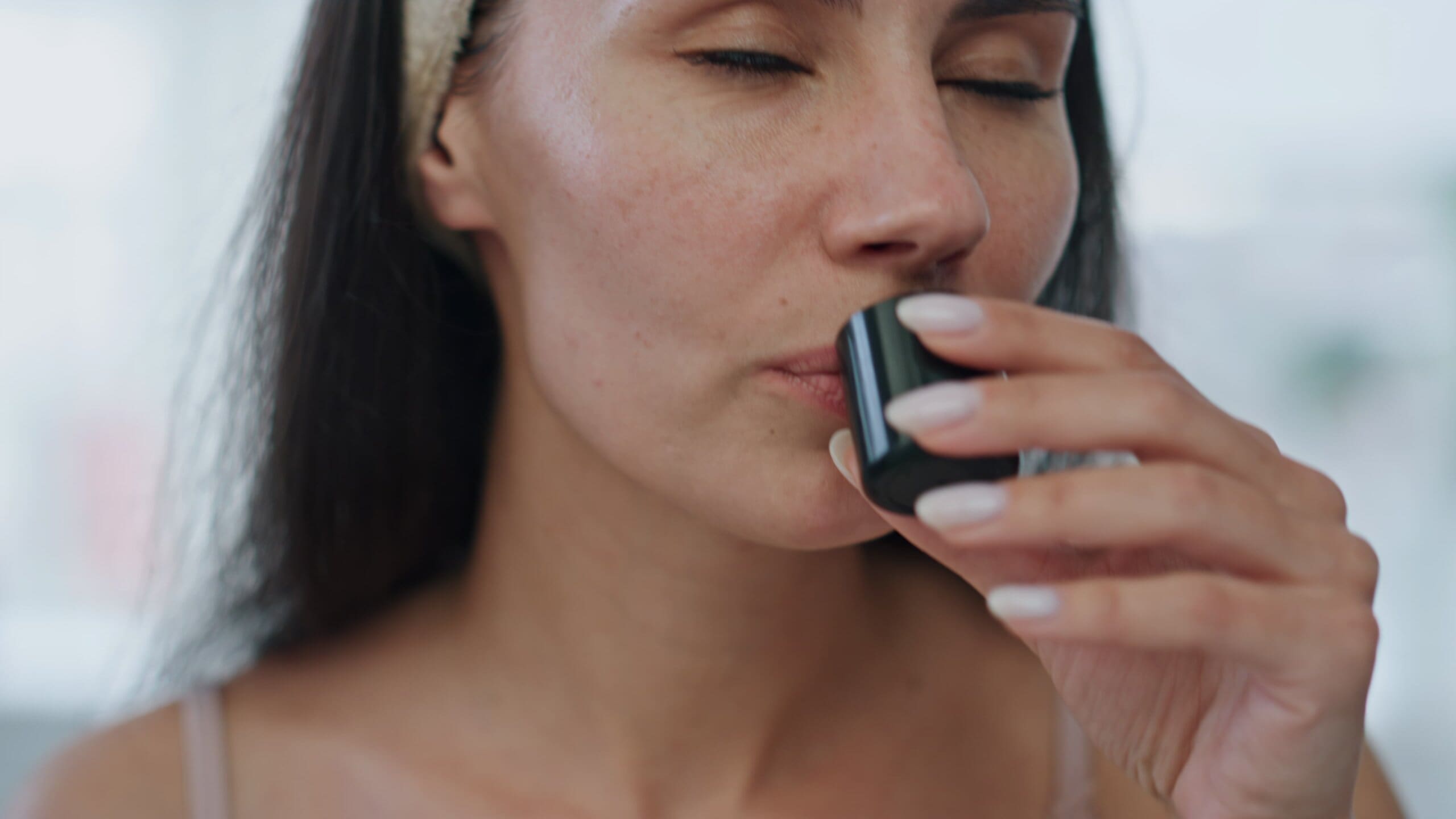Morning breath, also known as Halitosis, can be incredibly embarrassing, especially if you’ve just started dating a new partner and are worried about your first sleepover together! However, you can be secure in the knowledge that everyone has some form of morning breath, although there are certain triggers that make it worse.
We’ve discovered the causes of morning breath, plus how to stop morning breath so you don’t have to worry about scaring your new lover off as soon as you wake up! And if you’re wondering why your breath smells in the morning, even if you’ve brushed your teeth at night, we have the answers for you.

What is morning breath?
Morning breath is simply the smell of your mouth or breath when you wake up. If you’ve ever shared a bed with someone, you’ll likely know that in the morning, their breath is not as pleasant as it was when you went to sleep the night before.
The technical term for morning breath, or bad breath in general, is Halitosis. Halitosis, however, usually only refers to when your morning breath is so bad it constitutes an oral problem, in which case you should consider reaching out to a healthcare professional. As we mentioned earlier, regular old morning breath happens to the best of us, but knowing what causes it can help us figure out how to prevent it.
What causes morning breath?
Generally speaking, morning breath is caused by saliva. Even though saliva production slows down when you’re asleep, the enzymes in the saliva that are left break down whatever is in your mouth. So, if you have food left over between your teeth or your saliva production is being slowed even more for whatever reason, you’ll find yourself waking up with morning breath.
Contrary to popular belief, morning breath isn’t always caused by bad oral hygiene. That being said, it is one of the key reasons people wake up with a strong odour in their mouth, but there are other causes too.
Dehydration
Dehydration can cause morning breath as it prevents saliva in your mouth. Ever woken up with a severely dry mouth or throat? The likely cause is that you’ve not been drinking enough water throughout the day. Saliva is important for preventing morning breath or bad breath of any kind, as it flushes away bacteria and leftover food particles from your mouth.
These particles start to break down and rot, causing that unpleasant smell in your mouth. Since you should be aiming for around 8 hours of sleep per night, that’s a long time to go with a dry mouth, causing bacteria to break down to leave a nasty surprise in the form of morning breath for your partner when you wake in the morning!
GERD
GERD, or gastroesophageal reflux disease, is a common condition where stomach acid frequently finds its way back up to your esophagus, leading to heartburn and other uncomfortable symptoms.
GERD causes morning breath as during the night, this stomach acid and your undigested food reflux back up, causing a strong sour or acidic smell which can also damage your tooth enamel. While you sleep, this smell lingers and ferments, meaning you won’t only wake up with heartburn, but a serious case of morning breath.
To combat GERD, avoid trigger foods such as fatty or spicy foods, which is especially important before bed. To stop morning breath because of GERD, you should also make sure you wait long enough to sleep after eating, to allow your food to digest properly.
Smoking
Smoking can cause morning breath for a number of reasons. Similarly to dehydration, smoking prevents saliva production, causing bacteria buildup in your mouth that leads to a foul smell. However, smoking also increases bacteria growth in the first place, leaving behind plaque and tartar on your teeth that heavily contribute to morning breath.
The chemicals and particles in cigarettes leave a lingering smell in your mouth, so even if your breath doesn’t necessarily smell like tobacco, it will start to smell foul once the bacteria starts to break down. Smoking also causes bad breath thanks to it being a major risk factor for gum disease, which causes infection and a bad smell.

Poor oral hygiene
While as you can see, there are plenty of reasons you might be waking up with morning breath, poor oral hygiene is the number one cause. Not brushing your teeth properly or flossing between your teeth can leave behind a huge amount of bacteria and food particles in your mouth, which start to rot as you sleep.
As these particles break down, they produce volatile sulfur compounds (VSCs) as a byproduct, which cause a bad smell in your mouth. If you don’t brush your teeth before bed, you’ll likely notice that you wake up with far worse morning breath than if you had, and this is thanks to the food you ate the day before being trapped in your teeth.
Diet
If you don’t smoke, don’t suffer from GERD, drink plenty of water, and brush your teeth twice a day, your diet could be the reason why your breath smells in the morning. Certain foods such as onions, garlic, and spices, actually get carried through your bloodstream once digested and make their way to your lungs. The smell of these foods then comes out when you breathe, so if you’re wondering why your breath smells in the morning even when you brush your teeth at night, it could be because you’ve eaten foods containing garlic, onion, and spices the night before.
How to stop morning breath
Even though morning breath is super common, it can be embarrassing. Luckily, the easiest way to prevent morning breath is to follow healthy lifestyle tips such as staying hydrated and practicing good oral hygiene. However, there are some extra tricks you can try to stop morning breath.
Drink green tea before bed
One of the best bedtime drinks and a tea with sleep-enhancing effects, a mug of green tea before bed can help stop morning breath thanks to its antibacterial properties. Green tea is packed with polyphenols, which kill odour-causing bacteria in your mouth, specifically combatting those sulfur compounds we mentioned earlier.
If you’re out of mouthwash, you can use green tea to freshen your breath. Unlike alcohol-based mouthwashes, which dry out your mouth and can prevent saliva production, green tea increases saliva, which helps to wash away bacteria while you sleep.
Chew on parsley, mint, or coriander
Herbs like parsley, mint, and coriander contain chlorophyll, which is a natural deodoriser. Chlorophyll binds to the sulfur compounds in your mouth, neutralising their smell. These herbs also have antibacterial properties that help to kill the bacteria in your mouth.
Mint, as well as being antibacterial, has a fresh menthol taste, which you’ll recognise from your regular toothpaste. So, while slightly strange, there are more benefits to chewing on some mint than just replicating the fresh smell of brushing your teeth.

Rinse your mouth with baking soda
While slightly more unpleasant, you can rinse your mouth with baking soda after brushing your teeth in the evening to stop morning breath in the morning. Your mouth naturally becomes more acidic at night, which causes bacteria to thrive, but baking soda is an alkaline that neutralises these acids.
Half a teaspoon of baking soda mixed in a glass of warm water is the ideal mouthwash for balancing your mouth’s pH levels, too, which prevents you from getting a dry mouth during the night, which, as we discovered, leads to a stronger smell in the morning.
Try coconut oil pulling
Oiling pulling in the morning has plenty of benefits. While there’s no scientific evidence that it helps detox your body - which is what a lot of influencers have been seen using it for - it does benefit your oral health and help stop morning breath. Swishing 1-2 tablespoons of coconut oil around your mouth as the first thing you do when you wake up can remove plaque buildup, which contributes to bad breath. Oil pulling also loosens the plaque so it’s easier to remove when you brush your teeth, keeping them naturally whiter.
If you try oil pulling before bed, it will remove bacteria from your mouth that would otherwise break down and start to smell, so you’re more likely to wake up with fresher breath and less plaque buildup! Coconut oil can also help to reduce gum inflammation, so it’s great for your overall oral health as well as your morning breath.
How to get rid of morning breath
If you’ve woken up at a date’s house and realised you’ve got a serious case of morning breath, preventative measures aren’t going to cut it. Our top tip for how to get rid of morning breath is to grab an apple or other crunchy fruit or veg, as these work as natural toothbrushes, scrubbing bacteria from your teeth, freshening your gums, and helping to slightly improve your morning breath!
Tips for a good night's sleep
So now you know how to stop morning breath, you might want to consider other ways you can improve your health through your sleep routine. For example, check out our guide on the benefits of sleep for your skin, or learn how to stop grinding your teeth in your sleep to help your oral hygiene even further.
Of course, even the best bedtime routine is nothing without a comfortable mattress or supportive pillow, so take a look at our range today and optimise your sleep setup as soon as tomorrow with our free next day delivery service.






